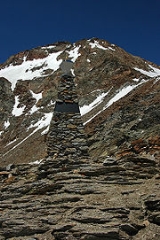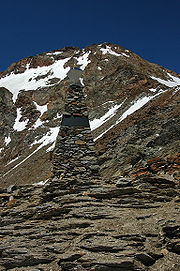
34th century BC
Encyclopedia
Events
- Life and death of Ötzi the IcemanÖtzi the IcemanÖtzi the Iceman , Similaun Man, and Man from Hauslabjoch are modern names for a well-preserved natural mummy of a man who lived about 5,300 years ago. The mummy was found in September 1991 in the Ötztal Alps, near Hauslabjoch on the border between Austria and Italy. The nickname comes from the...
, a mummy discovered in the Austrian/Italian Alps in 1991. - PloughPloughThe plough or plow is a tool used in farming for initial cultivation of soil in preparation for sowing seed or planting. It has been a basic instrument for most of recorded history, and represents one of the major advances in agriculture...
is first used.
Cultures

- Funnelbeaker cultureFunnelbeaker cultureThe Funnelbeaker culture, short TRB from Trichterbecherkultur is the principal north central European megalithic culture of late Neolithic Europe.- Predecessor and successor cultures :...
- Stage IIIa2 of the NaqadaNaqadaNaqada is a town on the west bank of the Nile in the Egyptian governorate of Qena. It was known in Ancient Egypt as Nubt and in classical antiquity as Ombos. Its name derives from ancient Egyptian nub, meaning gold, on account of the proximity of gold mines in the Eastern Desert.Naqada comprises...
culture in EgyptEgyptEgypt , officially the Arab Republic of Egypt, Arabic: , is a country mainly in North Africa, with the Sinai Peninsula forming a land bridge in Southwest Asia. Egypt is thus a transcontinental country, and a major power in Africa, the Mediterranean Basin, the Middle East and the Muslim world...
(dated in 1998). - Forms of the cuneiform scriptCuneiform scriptCuneiform script )) is one of the earliest known forms of written expression. Emerging in Sumer around the 30th century BC, with predecessors reaching into the late 4th millennium , cuneiform writing began as a system of pictographs...
(now archaic) emerge in the late Uruk periodUruk periodThe Uruk period existed from the protohistoric Chalcolithic to Early Bronze Age period in the history of Mesopotamia, following the Ubaid period and succeeded by the Jemdet Nasr period. Named after the Sumerian city of Uruk, this period saw the emergence of urban life in Mesopotamia. It was...
.

